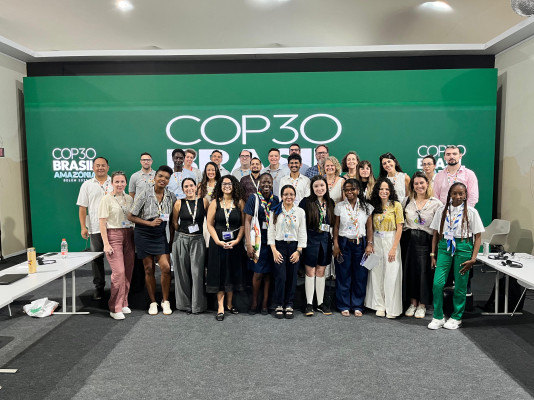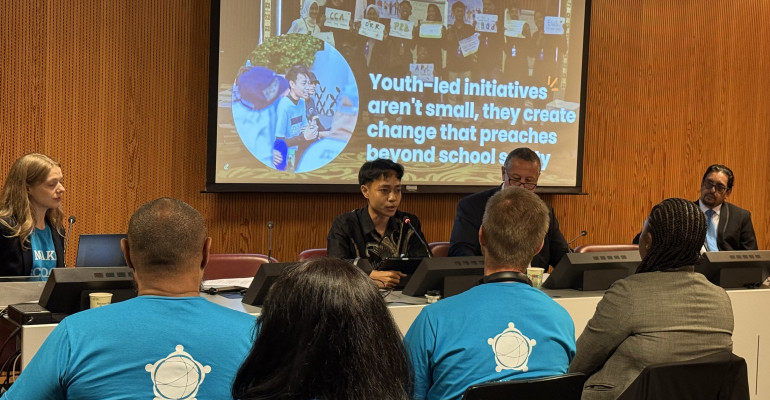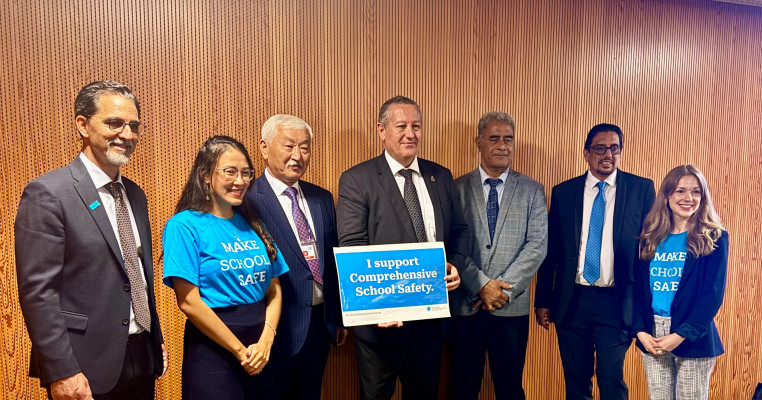From 2022 to 2023: time to press the accelerator to protect education from all hazards!
UNESCO & UNICEF
Dec 14, 2022 · 5 min read
By Yayoi Segi-Vltchek, Chief of Section, Section of Migration, Displacement, Emergencies and Education, UNESCO, and Linda Jones, Senior Adviser, Education in Emergencies, UNICEF
From 2022, a year for hope…
On the positive side, 2022 was a turning point full of hope for children, youth and education:
--Most education systems were on a path to recovery – and seemed to be learning many lessons – from the COVID-19 pandemic. Children themselves are putting in huge efforts to catching-up on all the learning they’ve missed.
--The Transforming Education Summit (TES), organized during the UN General Assembly in September 2022, was a unique opportunity to renew commitments to action in favour of education in crisis situations and to launch a new Greening Education Partnership. A lot more is to come as these commitments take shape in advance of the first progress report in 2025 and feed into the achievement of the SDG 4-Education 2030 Agenda.
--COP 27 witnessed timid, yet tangible efforts to implement calls initiated at COP 26 to speed up the introduction of climate change education in all countries, at all levels. The Global Partnership for Education (GPE) summarized COP 27 in a blog, highlighting synergies between education and climate finance among five key possible takeaways.
The launch of the Comprehensive School Safety Framework 2022-2030 in September 2022 was a highlight. Watch this 5-minute summary video for a glimpse of the momentum bringing members of the Global Alliance for Disaster Risk Reduction and Resilience in the Education Sector (GADRRRES), champion countries, donors and youth people together around one common goal: to promote child rights and resilience in the education sector in the face of all hazards.
However, on a more sobering note, 2022 was a year that saw numerous disasters impacting children and education systems around the world. In recognition of these on-going impacts mostly felt in climate-change vulnerable countries, Parties attending COP 27 agreed – 40 hours after the conference’s official closure – on the establishment of a loss and damage fund to protect countries that are most vulnerable to the impacts of climate change. This was a 30-year-old ask by Small Island Developing States and other vulnerable nations!
Sadly, children and education systems were affected not only by climate change, like floods in Pakistan, and extreme weather in Europe, but also by earthquakes in the Philippines and Indonesia, among other examples. Tragically, students and education personnel continue being targeted in conflict zones, for no fault of their own and sometimes simply because of their gender or who they are in a society. Think of Afghanistan, Colombia or Mali. For a complete overview, read the annual report of the Global Coalition to Protect Education from Attacks.
… to 2023, time to act
This brings us to 2023 – a year for which GADRRRES has high expectations. The CSSF 2022-2030 is being rolled out regionally and at country level, including in the Asia-Pacific region, Latin America and the Caribbean, as well as in Eastern and Southern Africa, which means that as a coalition we will be able to work in collaboration with member states and beneficiaries, beginning with children and teachers.
UNESCO, GADRRRES Chair as of October 2022, will keep advocating for the education sector to be fully integrated in the discussions emerging from the mid-term review of the Sendai Framework for Disaster Risk Reduction. Look out for the draft synthesis report to be published on the dedicated MTR SF Submissions and Reports page during the first quarter of 2023.
We are also excited to take part in the VIII Regional Platform for Disaster Risk Reduction in the Americas and the Caribbean (RP23), to be held from February 28 to March 2, 2023, in Punta del Este, Uruguay, as much as we were to attend the Asia-Pacific Ministerial Conference on Disaster Risk Reduction in September 2022.
At the same time, all GADRRRES members will keep focusing on project implementation to make a difference where most vulnerable children live.
UNICEF, for instance, will operationalize the Today and Tomorrow initiative, a child-focused climate financing mechanism launched at COP 27 and that will initially target eight countries: Bangladesh, Comoros, Haiti, Fiji, Madagascar, Mozambique, Solomon Islands and Vanuatu to support education and other sectors.
Save the Children and UNESCO, as accredited entities, will continue preparing and submitting high quality proposals focusing on education to the Green Climate Fund and the Adaptation Fund, such as those approved in 2022 and currently under implementation in Vanuatu and Haiti.
An ‘education’ call for COP 28
For COP 28 in Dubai, we call on partners to unite our efforts across the education community to make it a major moment for education in the COP process. Loss and damage, adaptation, climate finance, the Action for Climate Empowerment and gender agendas can all be used to re-position education as vital in the race against time to tackle the climate crisis. But also as a rather “forgotten sector” when it comes to responding to the impacts of climate change. While it takes a village to raise a child, education definitely has a role to play towards elevating climate negotiations to a new era!
Links to watch
UNESCO-UNFCCC webinar on 29 November 2022: Post-COP 27 climate change education – Where do we go from here? Link
COP 26 Ministerial Pledges on education and climate action (part 1: Finland, Sri Lanka, Andorra, Cameroon, Spain, Nicaragua, Greece). Link
COP 26 Ministerial Pledges on education and climate action (part 2: Commonwealth, North Macedonia, Jersey, Sierra Leone, Gibraltar, South Korea, Armenia). Link
COP 27 GADRRRES side-event (speakers from: GPE, GCF, Antigua and Barbuda, Prudence Foundation). Link
COP 27 UNESCO-UNFCCC side-event: Youth demand quality climate education: Ministerial session on climate education (government speakers from: Egypt, United Kingdom, Cyprus, Maldives, Malawi, Indonesia, Turkey, Romania, Senegal). Link
Regional launch of the CSSF 2022-2030 in Eastern and Southern Africa, 8 December 2022. Soon available on GADRRRES Youtube Page
First published here




